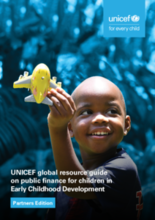Displaying 81 - 90 of 490
To investigate the early language development of children raised in institutional settings in the Russian Federation, the authors of this study compared a group of children in institutional care to their age‐matched peers raised in biological families, who have never been institutionalized using the Russian version of the CDI.
This article reviews the effects on children and youth of parent–child separation due to several of the most common reasons that are responsible for the growth in this family circumstance worldwide.
This resource guide aims to support UNICEF country teams, development partners and governments to deliver at-scale and sustainable results for early childhood development (ECD).
The first aim of this study was to investigate foster children’s social-emotional functioning (externalizing, internalizing and total problem behavior) reported by female and male caregivers, as well as by teachers, at 8 years of age, as compared with a non-foster group. The second aim was to investigate the predictive power of internalizing and externalizing behavior from age 2 and 3 years.
This Chapter from Education in Out-of-Home Care illustrates that increased resourcing is needed to facilitate the achievement of improved education outcomes for Australian primary school children in out-of-home care (OHC).
This study extends research on the effects of institutionalization—by examining the trajectories of cognitive, language and motor development of 64 Portuguese infants and toddlers across the first six months of institutionalization, while determining whether pre-institutional adversities and the stability and consistency of institutional care predict children’s development.
The objective of this study was to examine associations between being the subject of child protection reports in early childhood and diagnoses of mental disorders during middle childhood, by level of service response.
Objectives of this study were twofold. To identify combinations of adverse childhood experiences that are associated with out of home placement (OOHP)—based on both duration of OOHP and change in actual placement during each time point, among welfare involved youth. The second objective was to understand long-term negative outcomes during adolescence that are associated with greater placement instability.
The objective of this study was to determine if Spanish foster care children and Spanish non-foster children differ on sluggish cognitive tempo (SCT), ADHD-inattention (IN), ADHD-hyperactivity/impulsivity (HI), oppositional defiant disorder (ODD), limited prosocial emotions (LPE), anxiety, depression, social and academic impairment measures and if the duration of foster care predicts a reduction in symptom and impairment differences between foster and non-foster care children.
This article summarises how genetically informed research designs can help disentangle genetic from environmental processes underlying psychopathology outcomes for children, and how this evidence can provide improved insights into the development of more effective preventive intervention targets for adoptive and foster families.


